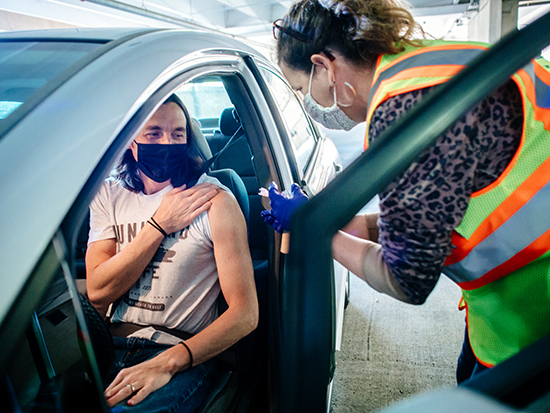The 2021 flu season is quickly approaching, and with a country already experiencing a COVID-19 surge, experts at the University of Alabama at Birmingham say getting the flu shot is more important than ever this year.
“This year, more people have returned to work and fewer people are wearing their masks in public, so we are expecting to see an increase in flu cases this year compared to last,” said Molly Fleece, M.D., an assistant professor in the UAB Marnix E. Heersink School of Medicine's Division of Infectious Diseases. “In order to protect yourself and your family, we recommend getting your flu shot now, or by October at the latest.”
Peak flu season is from December to February, and it takes a minimum of two weeks for antibodies against the flu to develop fully following vaccination.
Schedule your vaccine appointment here.
Flu vaccination prevents millions of illnesses and flu-related doctor’s visits each year, and it also reduces the risk of flu-associated hospitalizations. According to the Centers for Disease Control and Prevention, a 2021 study showed that, among adults, flu vaccination was associated with a 26 percent lower risk of ICU admission and a 31 percent lower risk of death from flu compared to those who were unvaccinated.
In addition to protecting adults, a yearly flu shot is the best way to protect children from the flu and its potentially serious complications. It is recommended that children get a flu vaccine every year in the fall, beginning at 6 months old. Some children 6 months through 8 years of age may need two doses for best protection.
The flu shot uses inactivated virus, which cannot transmit the flu. Common side effects experienced after the vaccine include soreness, redness, swelling, low-grade fever and aches that may last one to two days.
Although the flu shot is effective in preventing the flu, it does not protect people from COVID-19. The CDC says it is possible for someone to be infected with both flu and the virus that causes COVID-19 at the same time. That is why Fleece and Erin DeLaney, M.D., a family medicine physician and the vice chair of Clinical and Quality Affairs for the UAB Marnix E. Heersink School of Medicine's Department of Family and Community Medicine, say that, if someone has not received their COVID-19 vaccine yet, now is a great time to do so.
“Based on what we know from giving other vaccinations at the same time, we know that getting both your COVID-19 and flu vaccine is safe,” DeLaney said. “And we certainly recommend it, especially for the convenience of it.”
 Protect yourself this winter from flu and COVID-19 by getting vaccinated, wearing masks and social distancing.
Protect yourself this winter from flu and COVID-19 by getting vaccinated, wearing masks and social distancing.
(Photography: Steve Wood)Fleece reminds people that vaccines have been administered together for years.
“Although the COVID-19 vaccine is available for the first time in conjunction with the flu vaccine, administering two vaccines at the same time is not new,” Fleece said. “Both COVID-19 and the flu are respiratory illnesses that have the potential to make you very ill. The possibility of having both the flu and COVID-19 is concerning, but the bright spot in all of this is that there are vaccines available.”
For children who are not eligible for the COVID-19 vaccine, DeLaney says there are multiple measures parents can take to protect their kids this winter.
“Because some children are more vulnerable right now while awaiting approval of the COVID-19 vaccine, we want to think of other measures available to protect them,” DeLaney said. “Getting the flu vaccine, wearing masks and social distancing are all very important when it comes to protecting your children from COVID-19 and flu.”
UAB Medicine’s vaccine clinics make it easier than ever for patients to protect themselves from influenza and COVID-19. Find a vaccine clinic near you here.